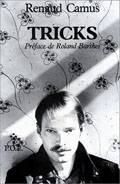Auteurs contemporains
Discours critique sur les œuvres de littérature contemporaine
Outils pour utilisateurs
Outils du site
Tricks
 Renaud Camus, Tricks, Paris, Mazarine, 1979.
Renaud Camus, Tricks, Paris, Mazarine, 1979.
« Ceci n’est pas un livre pornographique. Ni exploitation commerciale du sexe, ni tentative de titillation du lecteur : ratages et demi-fiascos, contingences et ridicules sont relatés au même titre que les plaisirs les plus heureusement partagés. Nulle prouesse.
Ceci n’est pas un livre érotique. L’art du narrateur, si art il y a, ne consiste pas en un effort pour rendre plus poétique le récit, plus culturel, plus relevé ni, partant, plus acceptable socialement. Pas d’esthétisme.
Ceci n’est pas un livre scientifique, certes, pas même un document sociologique. Les épisodes rapportés ne doivent leur agencement qu’au hasard, ou aux déterminations les plus subjectives.
Ce livre essaie de dire la sexualité, en l’occurrence l’homosexualité comme si ce combat-là était déjà gagné, et résolus les problèmes que pose un tel projet : tranquillement. »
(Quatrième de couverture)
Documentation critique
HARTLEN, Neil C., « Queer across the Atlantic: Homo/sexual representation in the United States and France, 1977–2001 », thèse de doctorat, University of Massachusetts Amherst, 2006, 324 p. +++ Thèse de doctorat / mémoire de maîtrise
###
Abstract
This dissertation examines homo/sexual representation in French and American literature and film from 1977-2001. I use the slash to distinguish between two areas of representation whose relationship forms the object of my comparative analysis. Focusing on narratives featuring sexual encounters between men, I analyze sexual representation as it ranges from reticence to frankness. I consider these same narratives in relation to what I call “homo representation,” the interpretation of sexuality in minoritizing terms of identities, communities and politics. I argue that French texts demonstrate a greater frankness in relation to sexual representation; the dominance of a universalist tradition in France, however, inhibits the categorization of these texts and the sexuality they depict as “homosexual” or “gay”—or at least limits the political significance of that categorization. In contrast, I argue that the American texts I consider participate in a minoritized gay literature and subculture that has evolved in response to the greater reticence around sexual representation in the American mainstream. That mainstream, however, proves to be more open to “homo representation” on the levels of both culture and politics.
I analyze texts by Renaud Camus, John Rechy, Dominique Fernandez, Edmund White, Cyril Collard, Gregg Araki, Guillaume Dustan, Dennis Cooper, Paul Smaïl, and Samuel R. Delany, situating them in the context of various genres. Applying minoritizing vs. universalizing strategies and normalizing vs. transgressive ones in different ways, these genres include coming out narratives (for which I propose an alternative gay Bildungsroman model), AIDS narratives, “ghetto” narratives, “assimilative” narratives and “queer” narratives. Within my American examples, minoritizing ghetto narratives predominate, establishing alternative community norms that are themselves challenged by more transgressive queer narratives. In my French examples, however, universalizing assimilative narratives are more usual, even as they reserve a surprisingly privileged place for transgressive sexuality in comparison with their more normalizing assimilative counterparts in the United States. I argue that these differences must ultimately be understood in relation to contrasting ways of situating sexuality, literature, and politics within the public and private spheres, even as those configurations continue to evolve in both countries through the 1990s and beyond.
La partie concernant Renaud Camus porte également sur Notes achriennes.
La version PDF de la thèse est disponible pour les membres de communautés universitaires qui ont un abonnement institutionnel auprès de UMI - Proquest###
POPPLEWELL, Daniel J., « Gaiety at a Time of Mourning: Reading Bathmology in Renaud Camus’ Tricks (1988) and Élégies pour quelques-uns (1988) », dans « French AIDS writing and the culture of redemption: A study of the literary response to the HIV/AIDS epidemic in France », thèse de doctorat, Columbia University, 2004, p. 70-99. +++ Thèse de doctorat / mémoire de maîtrise
### Abstract
This dissertation examines literary responses to the HIV/AIDS epidemic in France from 1985 to the present. After a survey of the history of the epidemic and the general literary response to it in France, it discusses AIDS writing as a distinct period in the evolution of representations of gay men in French literature. It focuses specifically on autobiographical work by Renaud Camus, Hervé Guibert, Pascal de Duve, René de Ceccatty, and Guillaume Dustan. It firstly inquires into what is specifically literary about their responses to the epidemic. It further considers the aesthetic and ethical relationship between AIDS writing and the long-standing autobiographical tradition of confession. The assumption that AIDS writing has a therapeutic function and that its value is to be found in a redemptive raison d’être is drawn into question. This involves broadening the scope of Leo Bersani’s term the culture of redemption. This study claims that a redemptive reading of AIDS writing is largely based in a condescending and negative vision of gay men. Furthermore, this reading distracts the reader from appreciating the reality of the experience of illness and devalues AIDS writing as a literary phenomenon. It fails to understand that many AIDS writers strongly identify with the process of writing as their primary mode of existence and that AIDS writing is often less a penance or cathartic purgation and more a combative and affirming means of self-expression.
La version PDF de la thèse est disponible pour les membres de communautés universitaires qui ont un abonnement institutionnel auprès de UMI - Proquest ###
| Tricks (oeuvre) | |
|---|---|
| Titre | Tricks |
| Auteur | Renaud Camus |
| Parution | 1979 |
| Tri | Tricks |
| Afficher | oui |